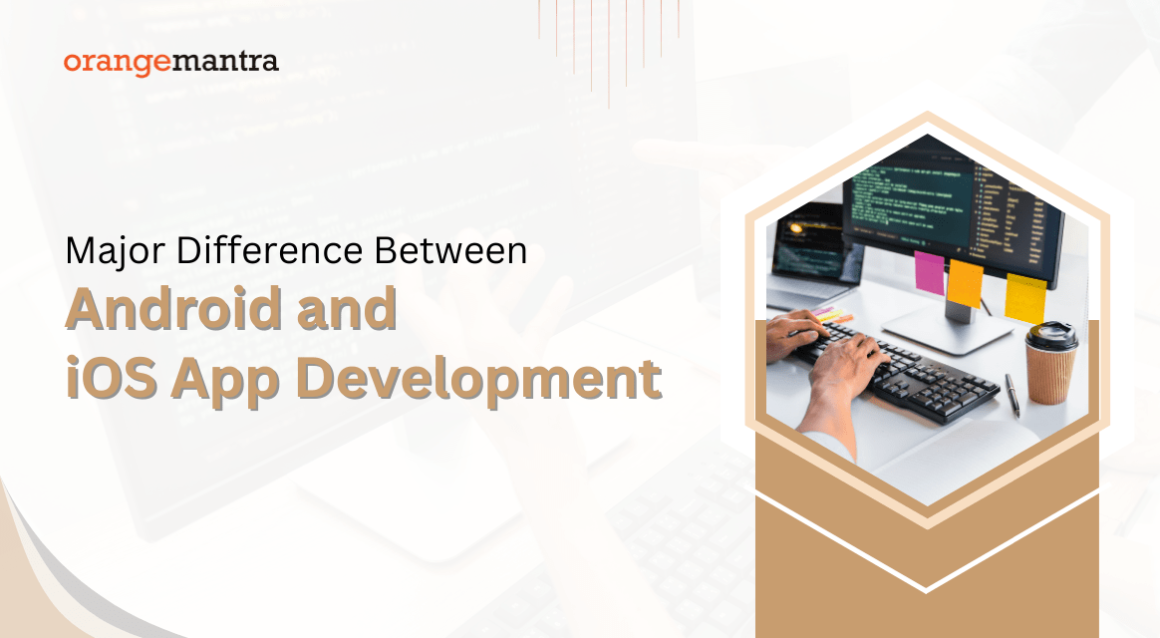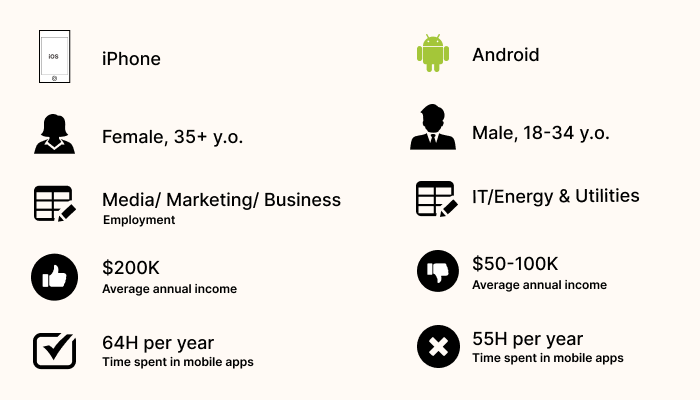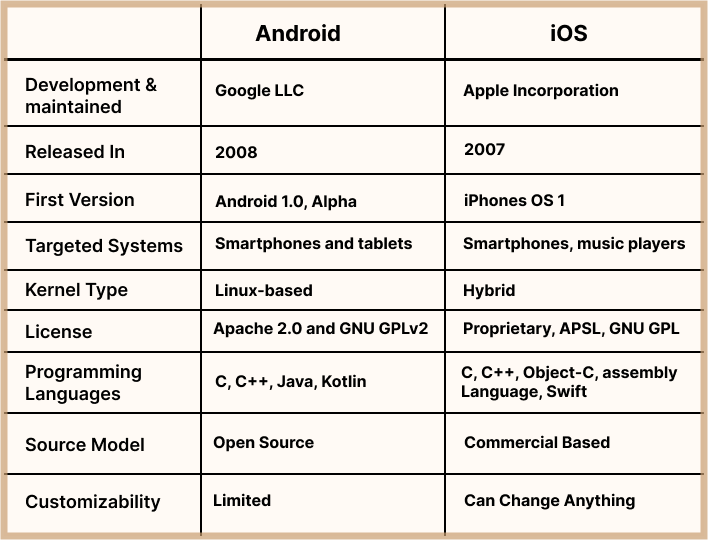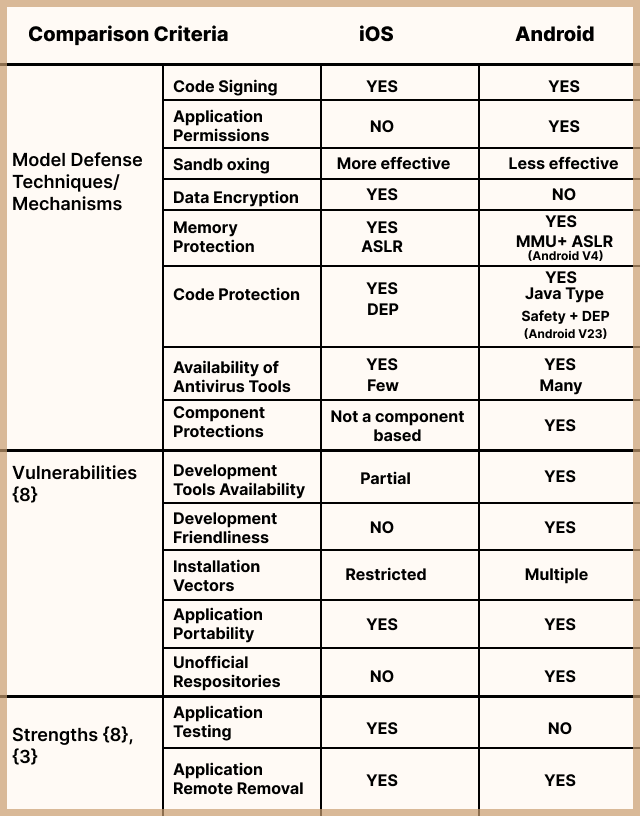As a Startup or existing business, it is important to choose the right platform for your mobile app. It can be difficult to decide between iOS and Android in 2024-24. So, it’s important to weigh the pros and cons of both platforms.
The two most use full operating system as we know is ios made by apple and android made by google .So there are tough comparison between them while selecting which one is better for app development each have there strength and weakness.
In this blog , we will explore the all major difference between iOS and Android application development and answer the question of which is best for start-ups as well as for your well set business . Following are some major factor which classified the exact difference like cost, design, user experience, Development time ,process ,functionality, user friendly ,Operating system and more to help you make an informed decision about which platform is right for you.
So, let’s get started with what is Android and iOS initially.
What Really is iOS?
In the market of mobile app development, iOS needs no inception or introduction. We all know that it is a mobile operating system discovered, maintained, and catered by Apple. It is a personalized operating system only designed for Apple mobile devices such as iPhones and iPods.
During its initiation, it was famous as iPhone OS. Simply, it is a Unix-like operating system that follows the Darwin operating system methodology. After Android, it is the world’s most used mobile operating system that is not just a symbol of unhindered users-experience.
The programs and apps run and are developed using C, C++, Objective C, and Swift, while Swift is majorly used in the current era by developers.
What is Android App Development Exactly?
You might have learned a lot of things about Android by now. Similarly, Android is also an operating system maintained by Google currently. This mobile operating system is inspired and derived from Linux kernel and other open-source software.
This OS was made specifically for touchscreen mobile devices like smartphones and tablets. Moreover, Android application development takes place in C, C++, Java, and Kotlin. For the record, Google unravelled the first version of Android in 2008, and later it became a mobile app technology trend.
Currently, Android 12 is the latest stable release of this operating system. Moreover, it is completely free and doesn’t cost a single penny to leverage the Android platform. So, the Android application is usually pocket friendly for businesses and entrepreneurs.
Moreover, almost every Android app development company also offer cost-effective assistances. Clearly, you would have understood the difference between Android and iOS as operating systems. Now get deeper into the difference between iOS and Android application development. And how it affects a business’s success ratio. So, let’s get started.
Market Share Of iOS and Android Apps
According to Stat Counter, Android clearly has a far larger market share compared to its closest rival iOS, where Android is popular amongst over 80% of the population.
Regionally, this dominance is evident while
- United States with 52.59% (iOS) and 46.98% (Android)
- Europe with 22.23% (iOS) and 72.71% (Android)
- Asia with 13.85% (iOS) and 83.09% (Android) market share.
Here are user stats for both platforms:
Succinctly, each of these platforms has their own loyal users boosting market for app development Android and iOS in current arena.
What Are Critical Differences Between iOS and Android Application Development?
When you are going to create a mobile application, you need to make sure that platform you have chosen has a significant positive impact on your business. Consequently, there are significant difference between Android and iOS app development practices and outcomes.
So, let’s get in-depth comprehension into them here.
iOS Vs Android App Development: Speed
When it comes to app development, speed is an important factor to consider. For startups, the ability to develop and launch an app quickly can be a major advantage in the competitive mobile market.
iOS development tends to be much faster than Android development. Since Apple uses its own programming language – Swift – iOS apps can be developed faster. Additionally, there are fewer devices and versions of iOS that need to be tested and accounted for. This makes testing simpler and speeds up the app development process.
Android, on the other hand, requires more time since the Android operating system is available on multiple device types with varying screen sizes. Developers must ensure that their app looks good and works correctly across all devices, which can take more time.
Additionally, Java is used for Android app development, which often requires more coding than Swift. Overall, iOS tends to be the faster option when it comes to app development for startups. However, this does not necessarily mean that it’s the better option for all businesses; it ultimately depends on the specific needs of the business and the goals of the startup.
iOS Vs Android App Development: Ease of Use
When it comes to ease of use, both iOS and Android offer their own unique benefits. iOS apps are often simpler to build and require less coding. This makes the development process easier and quicker, resulting in a shorter time-to-market for your app.
Additionally, the Apple App Store review process is often faster than its Google Play counterpart. Android, on the other hand, allows more flexibility when it comes to coding. This can be beneficial for more complex apps but can also add to development time and cost.
Furthermore, Google Play has a more rigorous review process than the Apple App Store, which can cause additional delays in launching your app. Ultimately, if you’re looking for a simpler, faster development process with a shorter time-to-market, then iOS might be the better choice.
However, if you want more freedom with coding. And don’t mind spending a little extra time on development. And the review process, then Android could be the right fit for you. So, if you want to create an Android solution, reach an Android app development company with seamless expertise and market exposure.
iOS Vs Android App Development: Design
When it comes to app design, both iOS and Android offer different experiences for developers. On the one hand, iOS is known for its sleek, modern look and feel. It is visually appealing and user-friendly, and users tend to appreciate the consistency in interface design.
Additionally, the App Store’s guidelines make it easier for developers to adhere to Apple’s standards for app design, ensuring that apps look professional and are attractive to potential customers. Android, on the other hand, offers more flexibility in terms of design.
Apps can look vastly different from one another, which gives developers more room to express their creativity. Developers also have more freedom to customize their designs; giving them the opportunity to create a unique experience that stands out from the competition.
However, this can be more challenging since there are no unified design guidelines that all apps must follow. In the end, both iOS and Android have pros and cons when it comes to design. Developers must weigh these pros and cons against their own objectives and needs before deciding which platform to use.
IOS Vs Android: A Quick Glance
iOS Vs Android App Development: Cost
When it comes to cost, both iOS and Android application development come with their own unique set of costs. For iOS, the cost of developing an app is usually more expensive since developers need to purchase a Mac computer.
Also, it requires them to obtain a developer license from Apple.
Additionally, app testing for iOS devices may require multiple versions of the iPhone or iPad, which can add up in terms of cost. On the other hand, Android app development tends to be less expensive due to the availability of cheaper development tools, as well as a large variety of different Android devices.
According to Cleveroad, here is the average amount of time necessary to build an app:
- Basic app: 300 hours,
- Medium complexity app: 600 hours,
- Complex app: 800 hours.
Additionally, Cleveroad outlines the rates of US and Eastern Europe iOS and Android developers.
However, as the Android market grows, so too will the cost of app development. In terms of maintenance costs, both iOS and Android apps need to be monitored and updated regularly. For iOS apps, this requires access to the App Store where updates and bug fixes can be released.
On the other hand, you can easily update Android apps through the Google Play Store or directly through the developer’s server. It is important to keep in mind that both types of app stores may charge fees for submitting or updating an app.
iOS Vs Android App Development: Security
When it comes to app development, security is always a primary concern. You want to ensure that your users’ data is safe and secure, no matter which platform you use for your app. Both iOS and Android have their own set of security measures in place.
iOS apps are generally more secure since Apple has stringent guidelines in place. Apps must pass strict review processes in order to be approved and released. Apple also has greater control over the hardware and software used to run the apps.
Android apps, on the other hand, are more open-source and developers can modify and customize them as they please. While this is great for innovation and flexibility, it can also leave Android devices vulnerable to malware.
Google does have some safety measures in place like Google Play Protect, but it is ultimately up to the user to protect their device. Overall, when it comes to security, iOS apps provide a higher level of assurance than Android apps.
However, Android users still have options available to ensure that their devices and data remain secure. In the end, startups should consider their security needs before making a decision on which platform to develop. Moreover, Android app development services comes handy to manage security and features.
iOS Vs Android App Development: Complexity
When it comes to development complexity, iOS and Android can be quite different. Android apps typically require more development time and coding knowledge than iOS apps do. This is due to the need for specific coding to handle different versions of the Android operating system.
And the vast number of device types on the market. Also, because the Android platform is open source, coding tends to be more complex than with iOS. The development process for iOS apps tends to be easier than for Android because Apple’s operating system is not as fragmented.
This means developers have a smaller range of devices and operating systems to account for when developing an app. Overall, the development complexity for Android apps requires a more detailed approach than iOS does.
It’s important for businesses to consider the complexity of app development when making a decision about which platform to use. Depending on your budget and timeline, one platform may be more suitable than the other. So, choose wisely between app development Android and iOS to ensure you get high-quality solution.
Read Also: How Android And iOS Have Learnt From Each Other Over The Years
Features Comparison: Difference Between Android and iOS
iOS Vs Android App Development: Pros and Cons
Pros of iOS App Development:
- iOS apps are more secure than Android apps as it is more difficult for hackers to penetrate their code.
- iOS app development is faster and easier to code than Android.
- The user interface of iOS apps is much simpler, making it easier for users to navigate and use.
- iOS apps have a more polished look and feel, making them more aesthetically pleasing and providing a better user experience.
- Apple’s App Store has stricter guidelines and approval processes than Google Play, which can lead to a higher quality of apps available on the platform.
- Developers have access to a wide range of features that can be implemented quickly, such as iCloud integration and Touch ID.
- The Swift programming language is much easier to learn than Java and can be used to create efficient, powerful apps in less time.
- iOS apps tend to generate more revenue than Android apps due to the larger number of paying customers on the Apple platform.
Pros Of Android App Development:
- Android is an open-source platform that offers developers more flexibility when creating their apps.
- The ability to use any device for testing makes it easier for developers to quickly test and deploy their apps.
- Developers can create a single app that will work across a wide range of devices, reducing development costs and time.
- Android apps are more affordable and easier to develop than iOS apps.
- The large Android user base gives developers the opportunity to reach a wider audience.
- Android’s popularity has also led to a wealth of third-party tools and libraries, making development faster and easier.
- Google Play Store also allows developers to publish their apps faster than Apple’s App Store.
Cons Of iOS App Development:
- Development of iOS apps can take more time than Android due to the limited design options.
- It is more difficult to find experienced iOS developers compared to Android developers.
- There are restrictions on hardware access that can limit the capabilities of an app.
- Some features may not be compatible with older versions of iOS.
- Publishing an iOS app can take longer than Android due to stricter submission guidelines.
Cons Of Android App Development:
- Android apps are more difficult to monetize, as there is no unified marketplace for app purchases like the App Store.
- These apps must be optimized for a wide range of device sizes and resolutions, making it difficult to maintain the same level of usability across all devices.
- Google Play Store rules are stricter than Apple App Store, which may make it more difficult to get your app approved.
- Developing an Android app requires more technical knowledge and expertise than iOS apps.
iOS Vs Android: Which One Should Businesses Choose?
It is hard to tell which platform can benefit businesses the most. However, the given differences between iOS and Android apps make it easier for businesses to decide for themselves. Overall, both iOS and Android have a significant number of perks.
From security to speed, user experience to complexity, both confront each other well. Moreover, aspects like target audience, type of app, and features also describe the faith of the app on both of these platforms. So, pick after in-depth contemplation.
You could also check this comparison between iOS app development platforms for an even deeper understanding.
Wrapping Up
When deciding between Android and iOS app development for your startup, it’s important to consider factors such as cost, speed, ease of use, design, security, and development complexity. Ultimately, the decision comes down to which platform is best suited to the goals of your business.
For those looking for a low-cost solution that is easier to develop, Android is usually the better choice. If you’re looking for a platform that provides more security and offers a higher-quality design, then iOS may be the way to go.
The good news is that there are now tools available that allow developers to easily create apps for both iOS and Android platforms, making it easier than ever to develop apps for both platforms. Ultimately, it’s up to you to decide which platform is the best fit for your startup.
At last, connect with iOS and Android application development company to get complete guidance and support.
FAQs
1. Are Android apps easy to develop?
Developing apps for the Android platform isn’t a walk in the park, particularly if you’re new to the field. It is however worth the effort since it opens up a large consumer base worldwide. When starting out, it’s recommended to keep your app simple, utilizing the pre-existing features available on the device.
2. Which is best language for iOS app development?
When it comes to iOS development, Objective-C and Swift programming languages are considered to be the best choice for creating apps for a variety of Apple devices, such as those running iOS, iPadOS, tvOS, macOS, and WatchOS. These two languages are widely used for crafting iOS applications.
3. Is Kotlin better than Java?
With superior support for Android development, the Kotlin compiler is a huge asset to developers of the Android platform. Null safety and Android Extensions are just a couple of the great features of Kotlin that make developing for Android easier and more efficient than Java. It’s clear why Kotlin has quickly become a favorite for Android app creators.

























